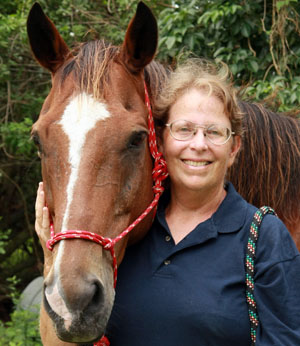TALES FROM THE TRAILS
The timing couldn’t have been worse.
For a while, a resident of Deer Run had noticed a horse standing in a pasture backing up to Lion Country Safari Road. Driving in and out each day, the horse seemed to always be there, just standing alone, and growing progressively thinner. Surely someone else had noticed and notified someone or done something to help? Yet, nothing seemed to change, and now Hurricane Irma was imminent.
Unable to bear the thought of a starving horse trying to make it through the storm alone, the resident asked neighbors for advice, then finally approached the horse’s owners. After talking with them, they agreed to surrender the horse.
Deer Run is a horse community in western Palm Beach County, and many others had also noticed the skinny horse and were willing to help. A group of concerned residents sprang into action. Someone offered to trailer the horse.
“You couldn’t help but notice the horse,” said Claudia Campbell, owner of Delmar Farm in Deer Run. “It looked like a really nice horse, a big bay, and it was getting visibly thinner. It’s not like I report every thin horse I see to Animal Care & Control. I thought maybe it was just old, or maybe it had some bad disease. Sometimes you can’t help it when a horse drops weight, but this was getting really bad.”
The timing was a challenge.
“Someone called and told me the owners said they’d give it up, but it needed a place to stay,” she recalled. “This was the night before the hurricane, and everything was somewhat chaotic. Unfortunately, I didn’t have any extra stalls or space, because of the storm.”
A temporary home was found for the horse, to keep him safe during the hurricane. Afterward, a more permanent home was needed.
“I told them to call Debbie,” Claudia said. “I knew she’d be the perfect person to help this poor horse. She has done many rescues.”
Debbie is Debbie McBride, another Deer Run resident. She, too, had noticed the skeletal horse. When she was contacted, she didn’t hesitate. “Bring him over,” she said, and somehow found room for him despite owning five other horses, not to mention goats, chickens and a pig.
The horse arrived and was signed over to her a day or two after the storm had passed.
Champ the horse arrived. Debbie discovered he was a Thoroughbred, and in very poor shape. “He was in bad circumstances,” she said. “Obviously starving, and also dehydrated. He had these deep, sunken spots above his eyes. His bones stuck out. It was sad.”
More people got involved, including another Deer Run horse person, Kristen Campagnuolo, who helped coordinate some of the online efforts. “It was so nice how everyone pitched in to help Champ,” she said. “The whole neighborhood came together and got this done, even though the hurricane was barreling down on us.”
In short order, Debbie had Brian Silvernail, an equine dentist, out to check on Champ’s teeth. “That’s always one of the first things you do with a skinny horse,” she said. “If a horse is old, he may have lost too many teeth to chew effectively. Or there may be rotting or misaligned teeth, which would also impact his ability to eat.”
Happily, Champ’s teeth were fine, and since he was tattooed — racing Thoroughbreds are tattooed on the inside of their top lips — they discovered he was 11 years old.
Next, Debbie called veterinarian Dr. Bill Yerkes.
“Dr. Bill is wonderful,” she said. “He basically donated his time. He pulled bloodwork and a Coggins, did a physical, and said Champ was basically in good shape, other than the weight issue.”
Yerkes estimated Champ was a 2 on the Henneke horse body condition scoring system, a numerical scale used to evaluate the amount of fat on a horse’s body. This standardized system, used by law enforcement agencies to score a horse’s body condition in cruelty cases, ranges from 1, extremely emaciated, to 9, extremely fat.
“This horse was pretty dire,” Yerkes said. “He was basically healthy, but hadn’t been getting enough to eat. With a starved horse, you need to be careful feeding him. Give him as much hay as he wants, but go on the slow side with grain, gradually increasing the amount over a week or so, or you risk colic.”
It turned into a real community effort.
“Someone posted a GoFundMe page, and a lot of people helped with donations of food and supplies,” Debbie said. “The Red Barn feed store set up an account where people could buy supplies for us. Champ’s prognosis is good. All he needs is time and groceries. He’s still pretty ribby, but he’s gaining weight steadily. He’s a really sweet horse.
Debbie has years of experience in horse rescues. “I don’t know how many rescues I’ve done over the past 17 years. Between the Premarin foals and mares, and feedlot babies, I’d say 60 to 100. I thought I was done with rescues, but Champ needed a home. The starved ones are always the most grateful,” she said.
Claudia is proud of the way the community came together for Champ.
“This was a great example of a horse community coming together and helping a horse in need,” Claudia said. “I have no forgiveness for someone who would let any animal starve. This is a horse community. Common sense dictates that all you’d have to do is ask a neighbor for help. I was glad to have helped put the parts together, putting people in touch with one another. It was a real team effort. Everyone came together to make it happen. What’s important is doing what’s best for the horse.”







